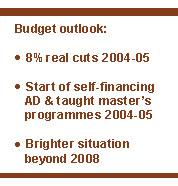Budget outlook: 2004-05 and beyond
Dear Colleagues,
The question of CityU's budget over the next few years is daunting, but there is reason to be optimistic in the long term. Despite pleas from the higher education sector, the Government will continue to reduce spending on universities. Two periods require attention: 2004-05 and 2005-08.The University Grants Committee has just informed the eight local universities and colleges that the indicative cuts in allocations for 2004-05, will be 8%, in real terms, over the 2003-04 baseline. That doesn't include deflation, nor the 3% cut in the civil service salary that university staff are asked to follow.
Nominal cuts, with everything factored in, will be around 13%, so it's going to be a hard time. The good news is CityU already has cushioned some of the impact by advancing a 10% cut to 2003-04, the current fiscal year. That decision gave us a little more breathing space and greater maneuverability to absorb the coming blows. Nevertheless, I ask you to be aware of the further demands on CityU; some associate degree (AD) and taught master's degree programmes will begin to lose government support and become self-financed starting in 2004-05.
The budget outlook for the 2005-08 triennium is still uncertain. Neither the Government nor the UGC has made a decision or announcement. While we understand that the Government needs to tighten its purse strings in its battle to balance the books, I firmly believe that the policy makers ought to avoid taking decisions—be they huge cuts in funding allocations, restructuring, or merging—that would hurt the fundamentals of the local higher education sector. What has been achieved in the past 15 or 20 years in our universities shouldn't be allowed to go to waste in a few short years.Beyond 2008, the financial situation may brighten up. Given the boom-and-bust cycle, the economy may move into a higher gear; there are signs that the economic recovery has started to pick up speed. And then there is the opportunity of the local universities switching to a four-year curriculum, hopefully in 2009, an issue on which the Government has reached an understanding, of late, with the eight tertiary institutions. With the launch of a new system, the universities, including CityU, might anticipate supplementary allocations from the Government.
In August, to help the University community land safely on the other side of the impending crisis, the Management Board set up a Core Group to deliberate staffing policies in times of dwindling resources. Headed by Professor David Tong, the group will propose new staffing arrangements and consider their effectiveness in easing long-term financial difficulties. Another of the Core Group's duties is to find out how funding withdrawal for AD programmes will affect the University's administrative and support services. The two issues (self-financing AD programmes and the overall budgetary situation) are obviously related, resource-wise. The University has to strike a good balance between taking care of the interests of a constituent group and meeting its obligations to the whole community.
I am committed to making these staffing proposals available for consultation before the Council meeting on 24 November.
Prof H K Chang
President and University Professor


